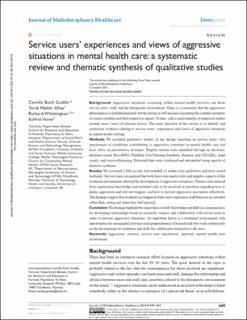| dc.contributor.author | Gudde, Camilla Buch | |
| dc.contributor.author | Olsø, Turid Møller | |
| dc.contributor.author | Whittington, Richard | |
| dc.contributor.author | Vatne, Solfrid | |
| dc.date.accessioned | 2020-03-20T08:29:34Z | |
| dc.date.available | 2020-03-20T08:29:34Z | |
| dc.date.created | 2015-10-05T11:37:19Z | |
| dc.date.issued | 2015 | |
| dc.identifier.citation | Journal of Multidisciplinary Healthcare. 2015, 8 449-462. | en_US |
| dc.identifier.issn | 1178-2390 | |
| dc.identifier.uri | https://hdl.handle.net/11250/2647692 | |
| dc.description.abstract | Background: Aggressive situations occurring within mental health services can harm service users, staff, and the therapeutic environment. There is a consensus that the aggression phenomenon is multidimensional, but the picture is still unclear concerning the complex interplay of causal variables and their respective impact. To date, only a small number of empirical studies include users’ views of relevant factors. The main objective of this review is to identify and synthesize evidence relating to service users’ experiences and views of aggressive situations in mental health settings. Methods: We included qualitative studies of any design reporting on service users’ own experiences of conditions contributing to aggressive situations in mental health care and their views on preventative strategies. Eligible articles were identified through an electronic database search (PsycINFO, PubMed, Ovid Nursing Database, Embase, and CINAHL), hand search, and cross-referencing. Extracted data were combined and interpreted using aspects of thematic synthesis. Results: We reviewed 5,566 records and included 13 studies (ten qualitative and three mixed methods). Service users recognized that both their own mental state and negative aspects of the treatment environment affected the development of aggressive situations. Themes were derived from experiential knowledge and included calls to be involved in questions regarding how to define aggression and relevant triggers, and how to prevent aggressive encounters effectively. The findings suggest that incidents are triggered when users experience staff behavior as custodial rather than caring and when they feel ignored. Conclusion: The findings highlight the importance of staffs’ knowledge and skills in communication for developing relationships based on sensitivity, respect, and collaboration with service users in order to prevent aggressive situations. An important factor is a treatment environment with opportunities for meaningful activities and a preponderance of trained staff who work continuously on the development of conditions and skills for collaborative interaction with users. | en_US |
| dc.description.abstract | Service users’ experiences and views of aggressive situations in mental health care: a systematic review and thematic synthesis of qualitative studies | en_US |
| dc.language.iso | eng | en_US |
| dc.relation.uri | https://www.dovepress.com/service-usersrsquo-experiences-and-views-of-aggressive-situations-in-m-peer-reviewed-article-JMDH | |
| dc.rights | Attribution-NonCommercial-NoDerivatives 4.0 Internasjonal | * |
| dc.rights.uri | http://creativecommons.org/licenses/by-nc-nd/4.0/deed.no | * |
| dc.title | Service users’ experiences and views of aggressive situations in mental health care: a systematic review and thematic synthesis of qualitative studies | en_US |
| dc.type | Peer reviewed | en_US |
| dc.type | Journal article | en_US |
| dc.description.version | publishedVersion | en_US |
| dc.source.pagenumber | 449-462 | en_US |
| dc.source.volume | 8 | en_US |
| dc.source.journal | Journal of Multidisciplinary Healthcare | en_US |
| dc.identifier.doi | 10.2147/JMDH.S89486 | |
| dc.identifier.cristin | 1278371 | |
| cristin.unitcode | 211,2,0,0 | |
| cristin.unitname | Avdeling for helse- og sosialfag | |
| cristin.ispublished | true | |
| cristin.fulltext | original | |
| cristin.qualitycode | 1 | |

